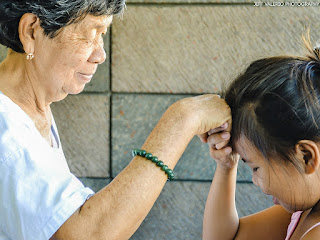Or do you not have a point where you'd stop? In a different thread, @Kung Fu Wang brought up an instance where he taught a girl who was being abused MA, then she stopped coming, he found out that the husband was now being attacked by her, and ended up teaching him MA.
So I had some hypothetical questions from that, that I didn't want to derail the thread with.
Assume for all the below that there's some sort of verifiable evidence for you about the person's intentions (either them telling you directly, multiple other people you trust have informed you, you've witnessed it, etc.), excluding option 4.
1. If he was still teaching the girl, and found out that she was now attacking (past defending herself) the husband, would you continue to teach her? What if you learned that she was the abuser from the beginning?
2. In the actual situation mentioned, would you teach the husband, knowing that the two were likely going to continue getting physical/violent with each other in the future, and now one of the two is trained because of you?
3. What about other situations, would you teach someone that you knew gets into bar fights a lot, or is ultimately planning to get into fist fights with the training? If so, is there a line that you'd draw?
4. What if you have no evidence, but for whatever reason, the individual seems like a slimeball to you, and you suspect their reasons for learning martial arts are malicious? Does this change if the person in question is 13 vs. if they're in their 40s and giving you that vibe?
5. What about someone who can't control themselves? I've seen teens/young adults with developmental disabilities or similar, where they get a lot of strength, and end up hurting their caretakers. There's often nothing malicious here, but impulse control issues combined with lack of comprehension about what they're doing and the impact it has. Would you teach someone like this, knowing that you could potentially be enabling them to hurt their caretakers further?
So I had some hypothetical questions from that, that I didn't want to derail the thread with.
Assume for all the below that there's some sort of verifiable evidence for you about the person's intentions (either them telling you directly, multiple other people you trust have informed you, you've witnessed it, etc.), excluding option 4.
1. If he was still teaching the girl, and found out that she was now attacking (past defending herself) the husband, would you continue to teach her? What if you learned that she was the abuser from the beginning?
2. In the actual situation mentioned, would you teach the husband, knowing that the two were likely going to continue getting physical/violent with each other in the future, and now one of the two is trained because of you?
3. What about other situations, would you teach someone that you knew gets into bar fights a lot, or is ultimately planning to get into fist fights with the training? If so, is there a line that you'd draw?
4. What if you have no evidence, but for whatever reason, the individual seems like a slimeball to you, and you suspect their reasons for learning martial arts are malicious? Does this change if the person in question is 13 vs. if they're in their 40s and giving you that vibe?
5. What about someone who can't control themselves? I've seen teens/young adults with developmental disabilities or similar, where they get a lot of strength, and end up hurting their caretakers. There's often nothing malicious here, but impulse control issues combined with lack of comprehension about what they're doing and the impact it has. Would you teach someone like this, knowing that you could potentially be enabling them to hurt their caretakers further?

